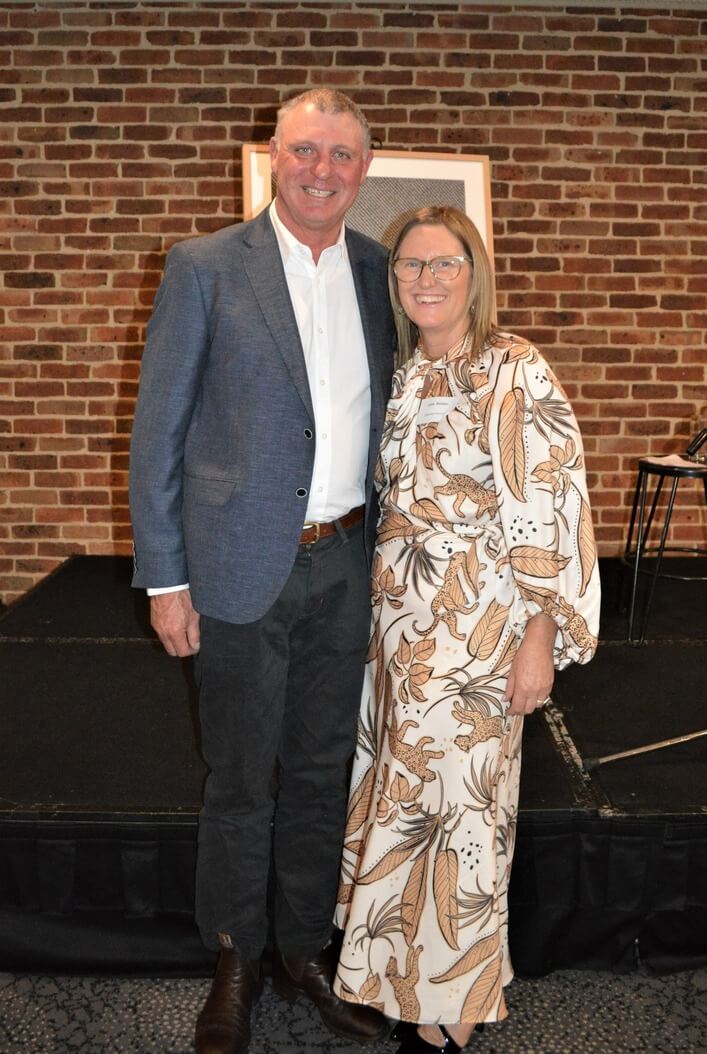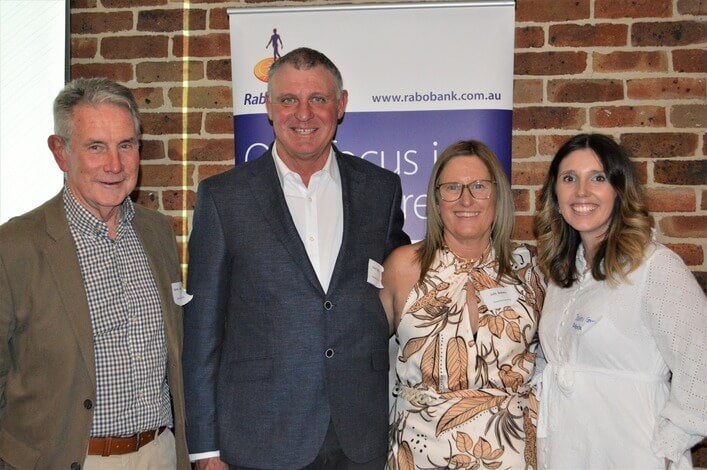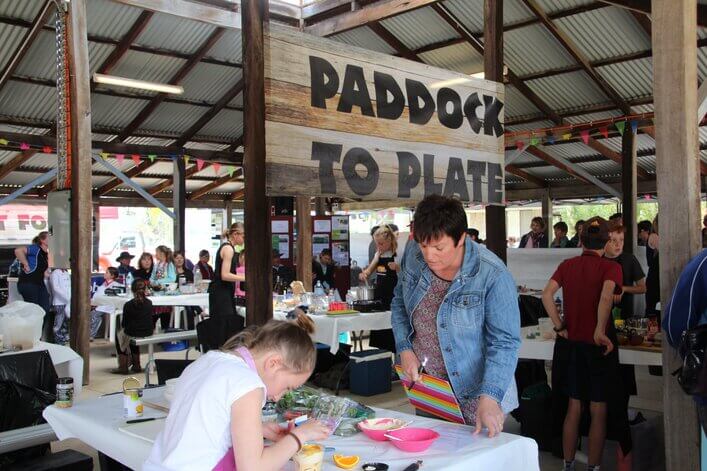Posted by on
08/12/2023
David and Julie Bellato at the Southern Valleys Cotton Grower Association Awards.
Coleambally’s David and Julie Bellato have been growing cotton for the past two decades, quietly trialling and adopting environmentally kinder farming methods across their property – long before sustainability was a buzzword.
And despite the lack of fanfare, their tireless efforts have not gone unnoticed, with the couple recently awarded the Southern Valleys Cotton Grower Associations Grower of the Year.
Admitting the announcement was a shock, David said it was a great privilege to receive the award amongst such a high calibre of local growers.
Whilst unexpected, Julie said it was a very exciting accolade, and that with the cotton industry having progressed so far in recent years, everyone should wear cotton with pride.
“David is a very good farmer, and he’s certainly not one to brag so it’s lovely for him to receive this recognition. I’m very proud of him, he’s worked very hard to ensure our operation is as sustainable as possible.”
With the local industry relatively young, established over the past 15 years, David began growing cotton with his brother Paul and Father Vic, nine years ago alongside their traditional maize and soybean growing enterprise.
“Cotton is a really handy crop to split our risk,” David explained. “In really warm and hot years, cotton does better than corn, and it provides an effective rotation to reduce disease and keep paddocks clean and weed free.”
While last year’s cotton crop was hampered by a wet, cooler season, prospects for the coming summer were exciting.
“We’ve had a warm start and the price outlook is good for cotton and cotton seed – cotton is a really profitable crop if you achieve good yields.”
It’s also a crop they believe deserves loud and proud championing.
Compared to 20 years ago, chemical use in cotton has decreased, but Julie is disappointed there was still so much misinformation surrounding cotton production.
“Cotton has an authentic family farming story that links directly to the customer, but unfortunately consumers don’t realise the significance of the fact that every person wears cotton, it is a strong and sustainable industry that contributes enormously to our economy and rural communities.”
David agrees, and said that where decades ago crops may have been sprayed regularly for insects, today thanks to the improved genetics of a cotton crop, only one or two applications – if that – are required.
“Cotton has come such a long way, and it’s a product we can all be proud of – the way we grow it is world leading, it’s clean, natural and grown sustainably.”
“As farmers we want what is best for our land, and our business – we don’t spray if we can avoid it, and with the cost of inputs we have to do things as efficiently as possible.”
Early adopters of sustainable farming
David and Julie have been combining conventional and biological farming for 20 years, inspired to maximise their soil nutrition to improve production and decrease inputs.
“We use chicken manure with our gypsum, which we source from a local chicken farm to encourage a circular economy for bi-products,” Julie explained.
“We’ve also adopted a number of soil moisture retention strategies, such as retaining our stubble, decreasing burn offs, and maintaining healthier our soils means less pests, and ultimately less chemical use.”
“There’s a lot of talk about regenerative farming, but the reality is that a lot of us have been using these practices for a long time,” she said.
The couple also recently purchased a spreader integrated with variable rate technology – whereby soil across a field is tested and mapped, and fertiliser spread accordingly. David said it was a far more efficient way of applying nutrients, with the technology enabling some areas in need of fertiliser to have a higher quantity, and more fertile soils to receive less.
Passionate about dispelling misinformation regarding the cotton industry, Julie was Executive Officer of the NRP Murrumbidgee Landcare in 2020, and has helped pave collaboration between Landcare and Cotton Australia to help showcase and encourage further progression.
Their enterprise, Greenline Farming, has provided the canvas for myriad trials over the years, helping contribute to much of this headway.
“We are looking into planting strips of native plants, such as Busaria Spinosa to attract bugs away from our crops, and the habitat encourages little birds that eat the bugs – it’s a fascinating natural balance that we’re looking to explore further.”
They also worked with the University of New England’s Dr Rhiannon Smith who has been conducting biodiversity and ecosystem services research in the cotton industry since 2005, trialling native species seeds spread by drones, and various other techniques to regenerate landscapes naturally.

Rabobank Griffith’s Bernie Conolly and Jaimi Gorman with David and Julie Bellato, centre.
Water use efficiency to be proud of
One of the most significant recent innovations across the property has been the redevelopment of a bank-less irrigation system.
With a surface water licence from Coleambally Irrigation, and a groundwater allocation they haven’t had to use during the recent wet years, developments across the property ensure every drop counts.
“We used to do all our irrigating through syphons, and we’ve spent a lot of time changing the layout of the property, laser levelling the paddocks for maximum water use efficiency.”
Bank-less systems negate the need for the labour-intensive manual transfer of water out of a water channel, over a bank and onto the crop via syphons.
Instead, banks are removed and water is released in stages, allowing water on and off the crop quicker for a more even watering, and preventing overwatering. It’s also significantly reduced their labour needs.
“Instead of spending two and half hours every morning and every evening throwing syphons, it now takes me just half an hour to get around all four of our farms,” David said.
“You just click the tab on the winch and it releases the door down for irrigation to begin.”
While the redevelopment of the property required significant capital expenditure – particularly the concrete component – David owns his own land forming machinery which saved on costs, and he believes he will also recuperate costs in water and labour savings.
“Whereas I used to employ a number of extra people to help irrigate, which is often easier said than done, now it’s a task I can easily do myself.”
Whether it’s developing the farm for water-use efficiency, or investing in machinery to drive nutrient-use efficiency, David said it would always be money well spent.
“Machinery and land development are big outlays, but in the long-run we’ll save on input costs, and enjoy greater production as a result.”
And while Julie is proud of their on-farm innovation, she believes it merely reflects the progression within the local industry.
“We feel very fortunate to be part of an extremely forward-thinking region, Coleambally cotton producers are visionary and innovative, and it was in this region that one of the first trials of Rubicon Irrigation automated water delivery occurred, whereby water on our farm can be stopped or started from anywhere in the world by the touch of a screen within two hours."
And while the Bellatos have all the structures in place for their whole watering system to be delivered autonomously, David takes a more practical view when it comes to physically being in the field.
“There’s something very reassuring about being in the paddock and seeing the crop each day, identifying any issues or changes as they happen – I know watering will eventually become automated, but I do think it’s important to keep your eyes on the crop throughout the growing season.”
David and Julie are also grateful to have the support of Rabobank Rural Manager, Andrew Makeham, out of the Griffith branch.
“During the development of the property Andrew was very encouraging, he visits us on farm throughout the year and it’s reassuring to know he gets agriculture, and shares our greater long-term vision despite the season.”
Sharing the farm to fibre story
While the ‘paddock to plate’ traceability story has helped consumers join the dots as to where much of their food comes from, Julie believes there are still a number of agricultural commodities that remain foreign to consumers.

Julie is passionate about sharing the farming story through initiatives such as Taste Colleambally Food and Farm Festival.
Aiming to help correct this discrepancy, in 2012 Julie was instrumental in establishing the Taste Coleambally Food and Farm Festival.
“The event was inspired to teach people about how we grow our food and fibre, there is still a disconnect around soybeans and corn in relating it to paddock to plate, and when people see a paddock of wheat, many don’t translate that into a bowl of pasta.”
The initial event included a biodiversity centre, and a 50 mile meal event with food sources within the 50 mile radius, and has today grown into a state significant festival.
“We really wanted to give visitors a unique experience, and it worked so well, reflected by the fact that in 2016 we attracted 4,500 people into a town with a population of just 600.”
“Our rural communities are only strong if people are willing to contribute, and ensuring our town remains vibrant is very important to me.”
While she is no longer on the festival committee, Julie remains passionate about sharing the farming story and contributing to Coleambally – with her commitment culminating in the development of a community function centre ‘The Muddy Duck’.
“I wanted to create a hub for our town, a meeting place where people could hold events, seminars, meetings or where university students could simply come to study,” she explains. “We also have a café open on weekends that features local, farm grown ingredients, and it’s been a really wonderful project that adds another element to our small town.”
Admitting that she has too many ideas, and not enough time, Julie is now turning her attention to the further promotion of local tourism through establishing sustainable farm tours across the region.
“There are not a lot of tourism opportunities around Coleambally, however I think for a long time we’ve overlooked our most unique experience, which is farming.” “Our farms are a genuine source of curiosity and interest, yet for people outside the industry there is very little opportunities to see a working farm.”
She is now in the planning stages of leading nature walks promoting endangered species that thrive in the irrigation region, such as the Plains Wanderer, Australasian Bittern and Superb Parrot – and how local flora and fauna happily co-exist with food and fibre production.
“I enjoy explaining how we’re farming in a sustainable manner, and thanks to my role in Landcare I have knowledge on a number valuable initiatives going on across the region, so getting groups in to take these tours will be a great way to help share this message.”
